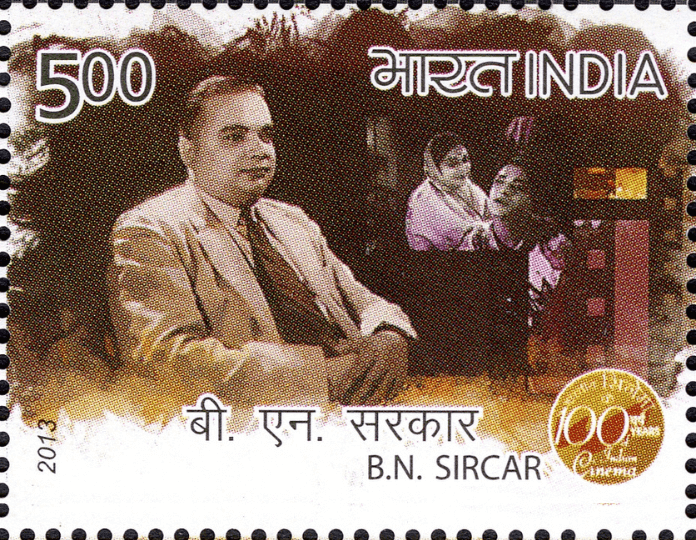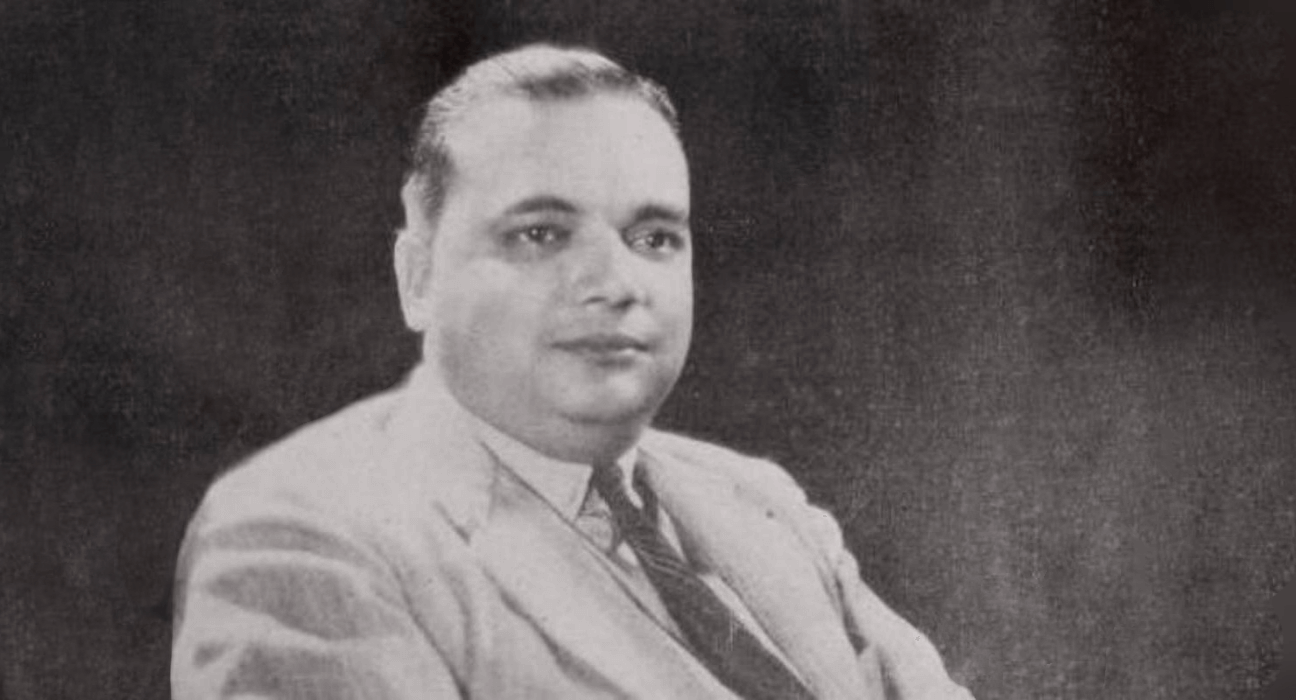Birendranath Sircar, commonly known as BN Sircar, was a towering figure in the Indian film industry. Sircar’s contributions to Indian cinema, particularly Bengali cinema, are monumental. He was not only a film producer but also the founder of New Theatres Calcutta, a studio that became synonymous with quality and innovation in Indian filmmaking.
Early Life and Career
Birendranath Sircar was born on January 5, 1901, in Bhagalpur. His father, Sir Nripendra Nath Sircar, was the Advocate-General of Bengal. BN Sircar’s mother, Lady Nabanalini Basu, managed the household. He grew up in a distinguished family with seven siblings. BN Sircar’s great-grandfather, Peary Charan Sarkar, was a pioneer educationist. He wrote several books for children to introduce them to the English language. Nagendra Nath, his grandfather, was a renowned barrister.
His early life in Bhagalpur and later in Calcutta exposed him to literature and theater, sparking his creative interests. Sircar completed his early education at Hindu School, Kolkata. He later pursued engineering at the City and Guilds of London Institute, London. Sircar completed his early education at Hindu School, Kolkata. He later pursued engineering at the City and Guilds of London Institute, London.

Upon returning to India, BN Sircar witnessed the huge public interest in movies. These events sparked something in young BN Sircar, and he started to study the technology involved in movie making. Interestingly, he received a project to build a cinema, which further ignited his interest in films. All these circumstances led to his decision to build his own theater for the screening of Bengali films. The resulting theatre was Chitra cinema, which was inaugurated by Subhas Chandra Bose on December 30, 1930.
Sircar produced two films under his banner, International Film Craft. First was Chasher Meye (1931), directed by Prafulla Ray and written by Premankur Atarthi. The second was Chorekanta (1931), directed by Charu Roy.
On February 10, 1931, he founded New Theatres Limited in Calcutta, a movie studio that became a cornerstone of Indian cinema, with the motto of “Jivatang Jyotiretu Chhayam (Light infusing shadows with life).” It was situated near Tollygunge, in the land of Basanti Cotton Mills.
New Theatres Limited
At New Theatres, Sircar gathered talented people from all over the country. Soon it became a hub for filmmakers like Premankur Atarthi, Raichand Boral, Debaki Bose, PC Barua, Nitin Bose, Dhiren Ganguly, Amar Mullick, Sisir Kumar Bhaduri, Hemchandra Chandra, Bikash Roy, Asit Sen, and many more. Later people like Bimal Roy, and Hrishikesh Mukherjee also joined New Theatres,
Musicians like KC Dey, Pankaj Mullick, Timir Baran, and Mani Bardhan also call it home. The early stars like Kanan Devi, KL Saigal, Prithviraj Kapoor, Chhabi Biswas, Bikash Roy, Pahari Sanyal, Basanta Chowdhury, Phani Majumdar, Jagdish Sethi, Uma Shashi, Leela Desai, Jamuna, Seeta Devi, Durga Khote, and Chandrabati Devi also started their journey from New Theatres.
The first film from New Theatres was the Bengali film Dena Paona, directed by Premankur Atarthi. The second film of New Theatres was “Natir Puja (1932),” a film based on Rabindranath Tagore’s play, where he also acted. In the next few years, the studio released films like Punarjanma (1932), Mohabbat Ke Ansu (1932), Zinda Lash (1932), Chirakumar Sabha (1932), Pallisamaj (1932), Chandidas (1932), Kapalkundala (1933), Sita (1933), Mirabai (1933), Ruplekha (1934), Mahua (1934), and Bhagyachakra (1935).



Films Made Under BN Sircar
In 1935 came P.C. Barua directed Devdas, starring Barua himself as Devdas, Jamuna Barua as Paro, and Chandrabati Devi as Chandramukhi. The film was based on Sarat Chandra Chattopadhyay’s novel and was abig success. Next year the Hindi version of Devdas was released with K.L. Saigal playing the tragic lover. The film’s poignant narrative and songs like “Balam Aaye Baso” established it as a classic.
“Mukti (1937), “directed by P.C. Barua, was known for its innovative storytelling and technical brilliance. Phani Majumdar’s musical “Street Singer (1938)” starred K.L. Saigal and was a significant success. “President (1937),” directed by Nitin Bose, was another notable production from New Theatres. Directed by Satu Sen, Chokher Bali (1938) was based on a novel by Rabindranath Tagore and was a critical success. BN Sircar was responsible for making adaptations of classics by famous Bengali litterateurs like Bankim Chandra Chattopadhyay, Sarat Chandra Chattopadhyay and Rabindranath Tagore. Sailajananda Mukhopadhyay and Benoy Chatterjee also wrote for New Theater’s films.
Sircar was known for his leadership qualities and his ability to attract and nurture talent. He provided directors with the budget they needed and allowed them to work without interference. New Theatres was one of the first studios to introduce sound in Bengali films. The studio’s film “Bhagya Chakra (1935)” was the first to use playback singing in Indian cinema.
Other Films and Decline
BN Sircar ran New Theatres for 24 years, producing more than 100 films in various languages, including Bengali, Hindi and Tamil. In the 1930s some of his other films inbclude Karwan-E-Hayat (1935), Manzil (1936), Maya (1936), Millionaire (1936), Anath Ashram (1937), Vidyapati (1937), Abhagin (1938), Adhikar (1938), Dharti Mata (1938), Adhikar (1938), Badi Didi (1939), Dushman (1939), Jawani Ki Reet (1939), Kapalkundala (1938), Sapera (1938), Rajat Jayanti (1938), Jiban Maran (1939), Haar Jeet (1939), Nartaki (1939), and Zindagi (1939).



In the 1940s, New Theatre faced many hurdles, from the Second World War to the Great Bengal Famine, which left the studio in a vulnerable position. It was a bad time for the whole industry, which was in very bad shape. The political situation was also not favorable for such business. On top of that came the partition and social and communal divide of the society. The violence and subsequent migration of a big population hit hard on the society, which also impacted New Theaters, which was already suffering.
In the 1940s New Theater produced films like Daktar (1940), Doctor (1941), Lagan (1941), Meenakshi (1942), Saugandh (1942), Kashinath (1943), Wapas (1943), Meri Bahen (1944), Udayer Pathey (1944), Humrahi (1945), Wasiyatnama (1945), Dui Purush (1945), Anjangarh (1948), Oonch Neech (1948), Chhota Bhai (1949), and Manzoor (1949).
New Theatres ran for a few more years, despite great financial difficulties. In the 1950s they only produced a handfull of films like Pahela Aadmi (1950), Roop Kahani (1950), Yatrik (1942), and Naya Safar (1953). Bholanath Mitra’s Bakul (1955) starring Rajlakshmi Devi, Uttam Kumar and Arundhati Devi, was the last film of New Theatres.
Personal Life
After the closure of New Theatres, Sircar continued to work for the development of industry. He held numerous positions in important film bodies, both private and governmental. He served as the president of the Film Federation of India, a member of the Central Film Censor Board, and a member of the Joint Advisory Committee of the Film and TV Institute and the National Film Archives of India. Sircar was also the chairman of the West Bengal Government’s Film Consultative Committee. He was a founding member of the Children’s Film Society.
Sircar married Rani Sircar, a supportive partner, in the 1920s. They had three children: sons Amitabh and Aniruddha and daughter Anjali. The family lived in Calcutta. BN Sircar passed away on November 28, 1980, at 79 in Kolkata.
BN Sircar on Wiki













Leave feedback about this